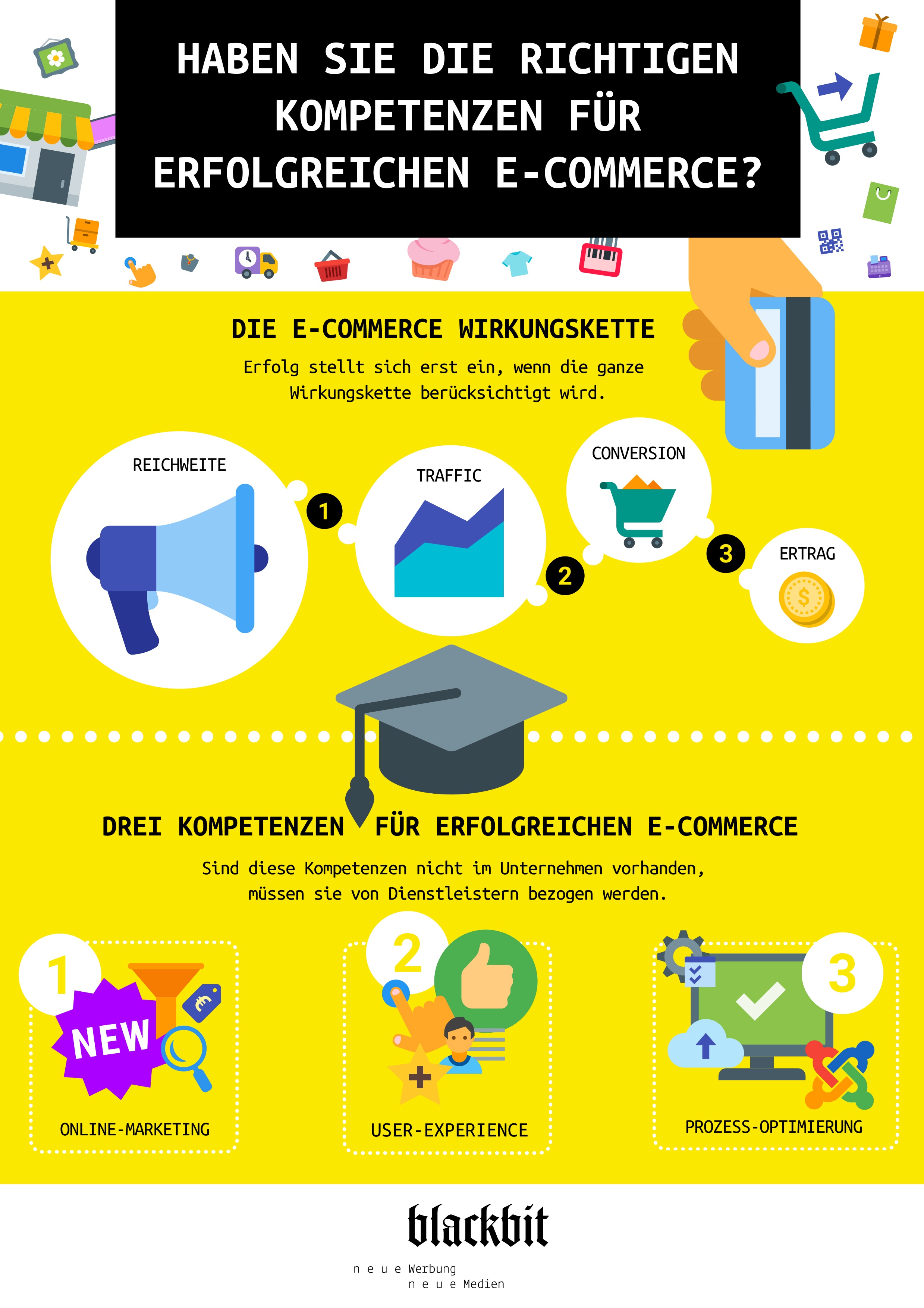The opposite of failure
In order to be successful, goals must first of all be clearly defined, because anyone who wanders aimlessly cannot be successful. Smart goals are a promise of sustainable success: specific and clearly defined. Measurable in facts and figures. Appropriate and accepted. Realistic and scheduled. In the end, success means that all efforts have paid off. But how do you sail on course for gold and become an e-commerce champion?

The e-commerce chain of effects
There are four steps that lead to a successful online shop:
- Reach: How can someone buy your products if you don't even exist online for the customer? If you want to sell, you have to be present and visible. With online marketing measures, you can make yourself known online.
- Traffic: Find out what makes your product range and your shop attractive to your target group, as this is the only way to generate lots of website visitors. All of your marketing measures primarily pursue one goal: a visit to the online shop.
- Conversion: Don't raise expectations that you can't fulfil, but surprise visitors to your shop with a positive shopping experience and simple, intuitive user guidance. After all, the conversion rate is much more important than traffic: how many of your visitors have actually made a purchase? How can the site be further optimised to increase the ratio of visitors to buying customers?
- Yield: If all processes are optimally harmonised and the user experience - based on design and usability - leads to a high conversion rate, then you have done everything right. Low costs, high revenues and time savings through optimised processes are what make an online shop successful and are rewarded by a high yield.
The three competences of digital commerce
When smaller online shops are initially successful, but then growth begins to falter, there is often a lack of the three core competences of digital commerce. Digital commerce is first and foremost technical - or so you might think. But what good is the best technology if the online retailer knows nothing about e-business? Not everyone has the important expertise. In the best case scenario, the competences can be divided between different departments or people, or an external service provider must provide support.
-
Online marketing:
The online presence is ready, the products or services are available, but none of this is of any use if the web shop has no visitors. So it's all about findability. This means that people are led to the website through search engine optimisation, social media and a sophisticated inbound marketing strategy, for example. -
User experience:
Creating shopping experiences is essential to free yourself from comparability and price pressure. In the best case scenario, visitors not only become buyers, but also returning customers. This requires an understanding of design and technical know-how in order to optimise the operation of the shop and create an overall positive user experience. At the end of the shopping experience is the check-out. Optimise this process so that it does not represent an additional barrier for the customer and possibly lead to them abandoning their purchase at the last second. The most popular payment methods should always be made available to the customer. -
Process optimisation:
Entering product information via merchandise management and shop software is often time-consuming and tedious. Automated processes save valuable time, nerves and money. The intermeshing of different systems simplifies the workflow. Centralised product information management works wonders when it comes to maintaining extensive product ranges, possibly in different languages, for different output channels. There is even greater potential for optimisation in the processes that follow after the customer has sent their shopping basket. The costs of warehousing, picking, despatch, order management, returns management and complaints handling quickly eat up potential revenue if systems and processes do not mesh.
As you can see, many small steps are crucial to the success of an online shop. The mainstay is definitely the technology in the background. Shop systems such as xt :Commerce 5 have proven themselves on the market for years. However, the mainstay of an online shop is also crucial to its success: Marketing activities that can be orientated in different directions, but never lose sight of your customer. Digital commerce requires different competences, which are not implemented in opposition to each other, but in support of each other.
To pick out just one discipline: Webshop design, based on the fundamental values and positioning of a brand, is an important factor in the success of an online shop and is crucial when it comes to impact, likeability and recognition.
You can find out more about design in our webshop tips
Do you have any questions or would you like a personal consultation?
Withdrawal button: Mandatory for many online stores
Why your website doesn't show up in ChatGPT & Co. and what you need to do now for AI visibility
CO₂ removal instead of compensation: why we invest in carbon removal
Structure, sound and distant destinations: Jacob Feuerriegel

Leave us feedback